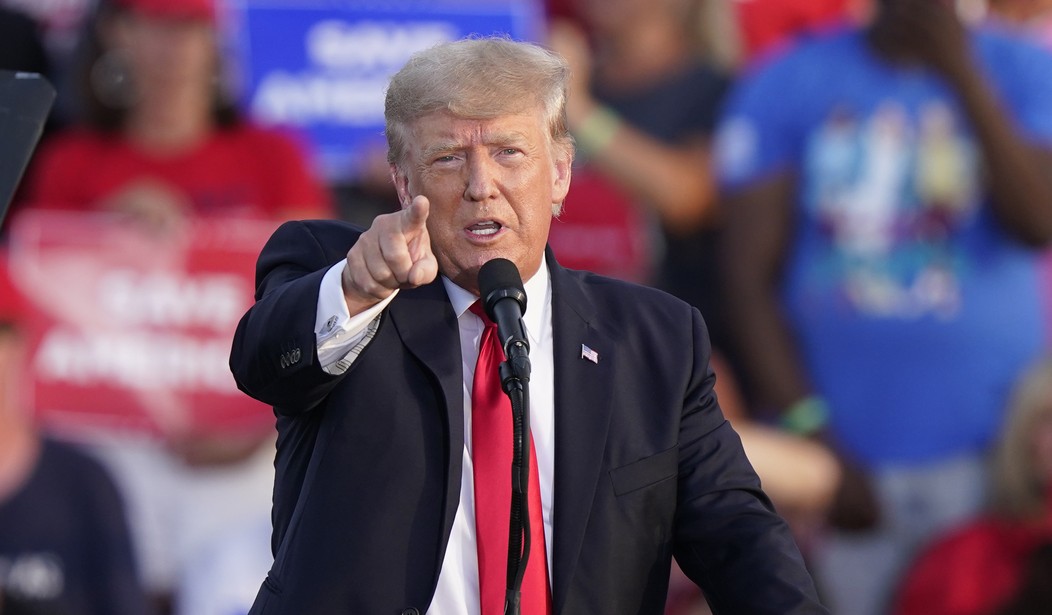As much as I want to scold him for not setting a good example, we should follow the science here.
And the science says that, as someone who was infected and later vaccinated, he has hybrid immunity. That’s the gold standard. Capable of repelling variants that haven’t even evolved yet.
So yeah, because of his unique circumstances, Trump doesn’t need a booster. But how many older Republicans who’ve been vaccinated and don’t have hybrid immunity will hear about this and conclude that maybe they don’t need the shot either?
More importantly, how many unvaccinated Republicans will hear about this and conclude that their favorite president is backing away from supporting the vaccines?
He isn’t, incidentally. But details like that tend to slip through the cracks when people think they’re being told something they want to hear.
Former President Donald Trump, who received a Covid-19 vaccination before leaving the White House this year, said he is unlikely to receive the booster shot that U.S. health regulators are expected to approve in the coming months.
“I feel like I’m in good shape from that standpoint—I probably won’t,” Mr. Trump said in an interview with The Wall Street Journal. “I’ll look at stuff later on. I’m not against it, but it’s probably not for me.”
He is in good shape COVID-wise, it’s true. But one can’t help wondering if the reception he got the last time he endorsed vaccination has led him to be more ambivalent about a third dose.
We can knock Biden here too for not acknowledging the benefits of natural immunity when he announced his federal vaccine mandate a few weeks ago. If he had made it a federal immunity mandate, with an option for the unvaccinated to prove they’re immune via a COVID antibody test, that would have made the policy more tolerable to skeptics. As it is, the fact that there’s no exception for natural immunity may leave the mandate more vulnerable to being struck down by the courts:
The stated goal behind mandatory vaccination policies is to protect against the spread of disease, meaning that the crux of any policy is immunity. The notion that a previous COVID-19 infection provides natural immunity that can be at least as good as vaccination in some people is something a judge would likely need to consider in a challenge to a mandatory policy, especially against a government actor.
“I think that a judge might reject a rule that’s been issued by a body, like the U.S. Department of Labor or by a state, that has not been sufficiently thought through as it relates to the science,” Erik Eisenmann, a labor and employment attorney with Husch Blackwell, told Yahoo Finance…
[Law professor Todd] Zywicki told Yahoo Finance that while government entities have a right to take reasonable precautions against the spread of communicable diseases, that power has its limits. Those limits, according to Zywicki, are grounded in the 1905 Supreme Court decision Jacobson v. Massachusetts that upheld a state smallpox vaccine mandate, though the precedent may be challenged given legal and scientific evolution.
“That was a different medical era,” Zywicki said. “There was no way to confirm whether you had a prior infection and recovery, which is obviously the case now.”
Telling workers that it’s vaccination (or weekly testing) or bust comes off as imperious, as if getting the shot is an end in itself. Telling them that they’re exempt if they’ve had COVID and recovered would shift the focus to immunity, the end to which vaccination is simply the means. The point of the mandate is to prevent the spread of the virus in workplaces. People would see that more clearly if those who are naturally immune were incorporated into the policy.
Even so, a new Gallup poll shows support for the federal employer mandate, and other mandates, sturdy at around 60 percent:

Interestingly, Gallup finds 93 percent support among Democrats for the federal employer mandate, which should reassure the White House after the recent data showing Biden slipping among African-Americans when he announced the policy. And support among American workers for workplace vaccine mandates is rising, jumping from 52 percent in August to 58 percent now. Maybe Biden’s mandate has brought more people along, although I’d bet that it was the surge of Delta in the southeast last month that’s responsible for most of the shift.
Speaking of party leaders setting a good example on vaccination for their base, I’ll leave you with this.
McConnell says he got his coronavirus booster shot "a few minutes ago," calling it an "easy decision" given his experience surviving polio before vaccines.
"I've been a lifelong champion of vaccinations… these safe and effective vaccines are the way to defend ourselves." pic.twitter.com/suUCxtLoyc
— Andrew Solender (@AndrewSolender) September 27, 2021








Join the conversation as a VIP Member